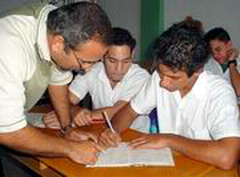Pedagogy 2007 closes with praise for Cuban Literacy Method
- Submitted by: admin
- Events
- International
- 02 / 04 / 2007

Educators from the Bolivian Department of Oruro sent a plaque of recognition to Cuban President Fidel Castro, presented Friday at the closing session of the international Pedagogy 2007 Congress in Havana.
The plaque reads: "To Fidel Castro Ruz for what he has done and is doing for Bolivia and for teaching that being educated is the only way of being free."
THE MEXICAN MUNICIPALITY OF ECATEPEC WILL ALSO APPLY THE CUBAN "YES I CAN" LITERACY TEACHING METHOD. PHOTO BY JORGE LUIS GONZALEZ
During Pedagogy 2007, the Mexican municipality of Ecatepec, the most populated in the country, signed an agreement with Cuban authorities for implementing the "Yes I Can" literacy teaching method with the goal of eliminating illiteracy in its territory within three years.
Faustino de la Cruz, a high-ranking local official, said that with the plan some 70,000 people will learn to read and write. The Cuban method is currently being used in close to twenty countries.
The agreement also calls for a project to improve the quality of education, with actions for the training and continuing education of teachers and the use of long distance education.
Cesar Torres, dean of the Latin American and Caribbean Pedagogical Institute (IPLAC), said that the agreement with the municipality of Ecatepec is similar to others signed with town halls, municipalities, territories and teachers associations to develop education with the aid of the island.
Speaking with the Prensa Latina news agency, Torres said that by the end of 2007, the method will be applied in 25 countries, while conditions are being created for its implementation in 8 African nations.
With the method, students can learn how to read and write in 10 weeks, and it is currently the most applied of its type in the world, stated Torres, who added that two million people have already left illiteracy behind, thanks to the project developed by IPLAC.
"Yes I Can" is currently available in Spanish, French. English and Portuguese, and is also being taught in Quechua and Aymara to indigenous people in Bolivia.
In recognition of its results, the United Nations Education, Science, and Culture Organization (UNESCO) awarded Cuba with the 2006 King Sejong Award, for its contribution to the improvement of education in numerous nations.
In the closing remarks, Cuban Education Minister Luis Ignacio Gomez, described the five day Pedagogy 2007 Conference as a very successful event, with the presentation of 2,311 papers, the largest in its history.
The Cuban minister announced that Pedagogy 2009 will begin on January 28th, in honor of the anniversary of Cuban National Hero Jose Marti.
Irene Gatica, coordinator of the Cuban method "Yes I Can" in Mexico D. F. read the final declaration. The document calls on all teachers to remain united in the struggle for an education that contributes to strengthening the values and culture of all people.
The closing ceremony was attended by high-ranking Communist Party and government officials, as well as national and international guests.
Comments